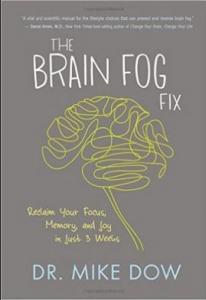It’s Dementia Action Week and as dementia and Alzheimer’s become leading killers in the UK, taking care of our brains is now more important than ever. Mike Dow, author of The Brain Fog Fix, suggests ways that we can improve our brain health and be more alert each day
One person is diagnosed with dementia every three minutes in the UK. Dementia Awareness Week has been renamed as Dementia Action Week. It’s time for us to act on making changes as well as raising awareness and helping to raise funds for people living with dementia.
Although many of us are concerned about the health of our bodies, considerably less of us think about the health of our brains. However, shocking statistics show that now, more than ever, we need to take care of our brains.
According to the Office of National Statistics (ONS), a shocking total of 51,498 deaths in England and Wales were caused by dementia and Alzheimer’s disease in 2014, with 34,321 of these recorded among women.
a shocking total of 51,498 deaths in England and Wales were caused by dementia and Alzheimer’s disease in 2014
The chilling statistics also show that dementia and Alzheimer’s have overtaken heart disease as the biggest cause of death for women in recent years – accounting for just over 13 per cent of those registered last year. It is now also the second biggest cause of death for men.
In today’s society, we have an unlimited supply of unhealthy foods, electronics and legal drugs at our disposal – all of which have negatively impacted the way we think and feel.
dementia and Alzheimer’s have overtaken heart disease as the biggest cause of death for women
It is hardly surprising that our brains are beginning to deteriorate faster, causing an increasing amount of us to suffer with depression, anxiety and stress – all of which can lead to Alzheimer’s or dementia.
So how do we fight back against these leading predators on our health?
From eating more omega-3s to getting eight hours of sleep a night, psychotherapist and author Mike Dow tells us exactly how we can improve our brain health.
1. Maintain blood sugar levels
In order for our brains to work properly, we need to sustain our blood sugar levels to keep our brain chemistry balanced. Increased blood sugar levels can lead to type 2 diabetes, which can lead to Alzheimer’s disease. The foods we eat can either produce steady, sustaining levels of blood sugar, or they can induce sugar rushes and crashes, which in turn can leave us feeling foggy, listless, anxious, and depressed. When your blood sugar spikes too often, it wreaks the same havoc in your brain as it does in your body. Diets rich in foods that spike our blood sugar levels not only make us fat, but are also setting us up for future risk of dementia, which has been correlated with perennially high blood-sugar levels. To minimize your blood-sugar spikes, you should regularly include certain foods in your diet, such as cinnamon, raw or slightly cooked vegetables, vinegar, tea and red wine. All of these have qualities that help keep your blood sugar levels in check.
The foods we eat can either produce steady, sustaining levels of blood sugar, or they can induce sugar rushes and crashes, which in turn can leave us feeling foggy, listless, anxious, and depressed.
2. Avoid Insulin Resistance
Our bodies need insulin to function properly as insulin delivers the blood sugar that cells use for energy. However, when we eat too many high GI-carbohydrates, our blood sugar spikes too much and we get excess insulin which our bodies do not process properly. This means we eventually end up storing the excess as fat and our bodies respond less and less to the constant barrage of insulin these high GI foods create, which leads to insulin resistance. When we become insulin resistant, our body does not register the amount of energy it is getting from carbohydrates and so starts wanting more than it actually needs. When we then feel like we need energy, we go for things that will provide energy fast such as processed carbohydrates which spike our blood sugar levels and will lead to an inevitable energy crash. This means that in the long-term, our brains will lack energy which will lead to us becoming more forgetful and foggier.
3. Avoid foods with a high Glycemic Index
The key to regulating your brain chemistry – and to keeping dementia at bay – is to limit your intake of carbs, or to replace the high-GI carbohydrates (such as white bread, white rice, pasta, cookies, cake, etc.) that trigger blood-sugar spikes (and subsequent crashes) with more complex carbohydrates that release slow-burning, sustainable energy for our brains.
white and even most whole-wheat breads have a glycemic index in the 70s, whereas sprouted barley has a glycemic index in the 30s
There any many ways to replace high-GI carbohydrates with healthier alternatives – try sprouted, flourless bread instead of your favourite white bread. Instead of white rice, try mixing your veggies with quinoa or sprouted barley. Instead of regular white pasta, try courgette or shirataki noodles. These swaps significantly bring down the glycemic load of your food; white and even most whole-wheat breads have a glycemic index in the 70s, whereas sprouted barley has a glycemic index in the 30s. These small changes will make you think and feel better and are also great for weight loss.
4. Eat more omega-3s…
It is important to eat healthy fats regularly in order to preserve the health of your brain. The absolute best fats for your brain are omega-3 fatty acids, which help prevent inflammation – the key to preserving cognitive function and warding off depression, stress, and anxiety. They are considered essential, which means the body needs them but cannot make them on its own. We can get them only through food, making it extremely important to go out of our way to incorporate them into our diets as frequently as possible.
The absolute best fats for your brain are omega-3 fatty acids, which help prevent inflammation – the key to preserving cognitive function and warding off depression, stress, and anxiety.
An easy way to get more omega-3s into your diet is to eat more fish. A general rule of thumb is to favour wild-caught over farm-raised fish as this normally contains a higher concentration of omega-3s and the lowest content of toxins. Other good sources of omega-3s include chia seeds, walnuts, flaxseeds and protein.
5. …and less omega-6s
On that note, you need to minimize your intake of omega-6s as they promote inflammation which can lead to some serious health problems. We are meant to have a balanced intake of omega-6s to omega-3s but nowadays we consume way too many omega-6s as they are hidden in a wide range of processed foods and refined vegetable oils (such as soyabean oil which is in many store bought dressings, pasta sauces, mayonnaise, etc.) This is causing greater inflammation of the brain which leads to depression, anxiety and brain fog. It is important to balance our intake to feel and think better. Replace shop bought salad dressings with healthy monounsaturated fats like olive oil. Cooking and dressing with olive oil will greatly benefit the brain and help get omega-3s into your diet easily.
6. Go organic
Organic produce does not contain any of the harmful pesticides found in non-organic produce making it cleaner for both your body and brain. However, this is not the only benefit as it also typically maintains higher levels of brain-healthy, anti-inflammatory omega-3s than its non-organic counterparts. For example, organic milk contains 62% more omega-3s and 25% fewer omega-6s than conventional milk. Therefore, buying organic can significantly help you eat cleaner which will make you think and feel better.
organic milk contains 62% more omega-3s and 25% fewer omega-6s than conventional milk
7. Get more folate
Folate is a vitamin B that can help fight depression, brain fog, dementia and Alzheimer’s by enhancing neurogenesis and decreasing inflammation in the brain. It is now even available as a prescription used to treat depression. There are high levels of folate in vegetables such as spinach, Brussels sprouts, romaine lettuce, asparagus, broccoli as well as in legumes like lentils, kidney beans, and black-eyed beans so make sure you eat plenty of these foods.
8. Use the 80/20 rule
Once you get your brain chemistry in check, it is important to follow the 80/20 rule. This means that 80 percent of the time, you eat the brain-healthy, energy sustaining foods suggested here, and the other 20 percent of the time you can eat a bit more freely. This accounts for special occasions or when you fancy a bit of indulgence.
MEDICATION
9. Avoid medication unless it is essential
There are many people who do suffer from serious diseases like depression and are in real need of medication. However, many of us are overmedicated, taking over-the-counter and prescription drugs – including aspirin, antibiotics, birth control pills, asthma medications, ibuprofen, and steroids – all of which can deplete B vitamins which are essential for boosting mood and energy.
Taking medication we do not really need may increase the risk of inflammation in the brain, causing it to age more rapidly and think less clearly.
Taking medication we do not really need may increase the risk of inflammation in the brain, causing it to age more rapidly and think less clearly. Therefore, instead of mindlessly popping pills all the time, we should first consider adjusting our lifestyles and diets, which could treat us just as well, if not better. For example, having a diet high in omega-3s levels could reduce anxiety by 20 percent.
10. Bring nature indoors
Pesticides and pollutants we face everyday fog our brains which can lead to depression, anxiety, dementia and other health problems in the future. Avoid environmental toxins as much as possible to feel and think your best. Keep your windows open as much as possible, since indoor air is often far dirtier than air outside. Also make an effort to minimize the dirt you bring into your house. Research shows that people who take off their shoes at the front door significantly reduce the amount of dust containing PCB toxins in their home.
11. Avoid tap water
Water can easily be polluted by nasty toxins that affect our brain health. To avoid these, invest in an inexpensive activated carbon filter water pitcher, which can remove 60 to 100 percent of the toxin manganese from your water. If you buy plastic water bottles, look for BPA-free versions but glass or stainless steel water bottles are an even safer bet to avoid dangerous toxins. If you do buy water in disposable plastic bottles, don’t let them sit out in your car or garage, since heat makes the chemicals leach from the plastic, meaning harmful toxins get into your water.
12. Check your cooking equipment
Non-stick cookware is often manufactured with perfluorooctane sulfonate (PFOS) and perfluorooctanoate (PFOA), which has been shown to cause tumors in rats. Ditch your nonstick cookware in favour of cast iron or stainless steel. If the pan’s coating is chipped or flaking, throw it out. The older these pans get, the more likely they are to release toxins.
13. Clean your house regularly
The air in our homes might be swirling with any number of invisible toxins that can reduce our ability to perform mental tasks and even contribute to diseases as serious as cancer. To counteract these effects, dust and mop regularly and use a HEPA filter on your vacuum and heating or cooling systems. Use environmentally friendly paints when painting your home as many paints contain dangerous chemicals that affect the air quality of your house.
14. Put houseplants in every room
Houseplants are an easy and effective way to purify the air in your home while also soothing your spirit. Plants such as lady palm, dwarf date and peace lily are particularly effective at cleaning the air you breathe.
15. Exercise regularly
Exercise may be the single best mood booster out there. It’s extraordinarily effective at boosting energy and combating both anxiety and depression. A study that divided depressed patients into three groups; the first of which took the popular antidepressant Zoloft, the second exercised for 45 minutes with no Zoloft and the third took Zoloft and exercised found that after a ten month period, only 8 percent of the exercising group saw depressive symptoms return, compared to 38 percent of those taking Zoloft and 31 percent of those taking Zoloft and exercising. This is one of many studies that show that exercise, when done consistently, actually outperforms antidepressants in improving mood and cognitive function.
exercise, when done consistently, actually outperforms antidepressants in improving mood and cognitive function.
Exercise not only helps you feel better, but helps you think better too. It boosts levels of brain-derived neurotrophic factor (BDNF), which supports cell growth in the brain and promotes neurogenesis while destroying Alzheimer’s disease-causing plaques. Stimulating BDNF through exercise is like stem-cell therapy for your brain. It helps create new pathways as you engage in new and challenging experiences.
16. Make walking a priority
Commuting by car or train can be very stressful and can highly affect our moods, especially when traveling in rush hours or traffic jams. This can lead to stress, anxiety and even depression and can cause us to have inactive lifestyles. Incorporate walking into your everyday routine – walk to your local supermarket, restaurants or gym instead of driving. This will promote a moving lifestyle which is vital to your health and will help you feel, think and even sleep better.
17. Get 8 hours of sleep a night
Sleep boosts learning and creativity, and acts as the brain’s “self-cleaning” cycle to prevent brain fog and gets rid of Alzheimer’s-causing plaques. And since sleep affects the stress hormone cortisol, it’s also involved in weight loss. (Excess cortisol signals the brain to store belly fat, and lack of sleep also triggers a release of hormones that trigger cravings for the unhealthiest foods. Excess cortisol can also negatively affect serotonin and dopamine in the brain.) All of these factors work together and can be thrown off by just one or two sleepless nights.
Sleep boosts learning and creativity, and acts as the brain’s “self-cleaning” cycle to prevent brain fog and gets rid of Alzheimer’s-causing plaques.
It is therefore important to make sure you get roughly eight hours of sleep a night. Although many people may think six hours is enough, a study carried out by the University of Pennsylvania found that people who slept about six hours for multiple nights in a row had the same performance deficits as subjects who had been totally deprived of sleep for two nights.
18. Avoid electronics at night
Although many people may consider themselves ‘night-owls’, nature intended for us to sleep at night and be awake during the day, and not doing this affects how clearly we think and how alert and positive we feel. The pineal glands in our brains produce a hormone called melatonin, which helps regulate our sleeping and waking cycles. When it’s dark out, the pineal gland releases more melatonin to signal that it’s time for us to wind down and go to sleep. When light breaks outside our window, the pineal gland slows down melatonin production, signaling that it’s time to wake up.
However, nowadays, our constant use of technology means we are surrounded by light all of the time – we even check our phones and tablets when we are in bed. Even the colour of the light our devices gives off affects us as they emit blue light which is particularly good at suppressing melatonin production in our brains. This leaves our bodies no longer knowing when to produce melatonin as they no longer know when they’re supposed to be asleep.
Even the colour of the light our devices gives off affects us as they emit blue light which is particularly good at suppressing melatonin production in our brains.
The best thing to do is to avoid electronics in the evenings. Turn off all devices three hours before bedtime so your body can get use to knowing that it is night time. If you can’t do this, turn your devices to the dimmest setting possible. Remove TVs and other electronic devices from the bedroom, charge your phone in a different room to your bedroom to avoid nighttime checking and read books before bed rather than electronic versions, such as kindles.
19. Don’t get distracted at work
Technology has an addictive pull on us. Indeed, every time we get likes on a Facebook status or an Instagram picture, we experience a little surge of pleasure that gives the brain a tiny hit of dopamine, making us feel good and thus encouraging us to do it over and over again. Therefore, unsurprisingly, social media can cause us to get distracted easily. This can cause us to fall behind on work meaning we end up working overtime to catch up. This can lead to stress, anxiety, and depression as we end up having to work into the evenings and so do not get the downtime we need for our brains to function properly. Avoid social media (block your access if necessary) and turn off your phone or ringer until you are on a break to stop distractions getting in the way of work. Cutting back on media use will have positive effects on your brain, mood, energy levels and quality of sleep and will also help extend your attention span.
20. Socialise in reality
Human beings have an innate need to feel supported, connected, and loved, making it no surprise that loneliness has been linked to depression among other things. Although social media was supposed to make it easier to keep in touch with friends and enhance connections, a 2013 study showed that checking Facebook actually made people feel worse. If we see someone else doing well when we are not, it can make us feel that our lives are not up to scratch and can leave us feeling depressed. Disconnecting from social media and strengthening our real-life relationships can help us think clearer, be more productive and less self-loathing.
Although social media was supposed to make it easier to keep in touch with friends and enhance connections, a 2013 study showed that checking Facebook actually made people feel worse.
A review of 148 studies that included more than 300,000 people suggested that extreme loneliness may actually be deadlier than smoking and twice as deadly as obesity. In this analysis, stronger social relationships resulted in a 50 percent increased likelihood of survival. And another study of more than 800 older adults over the course of many years showed that being lonely can double your risk of Alzheimer’s disease in addition to leading to cognitive decline. Instead of spending your evenings alone in front of the TV checking Facebook on your phone, meet up with a friend for drinks or a class – this will help you feel the connection, support, and companionship that is needed for thinking and feeling better.
21. Exercise your prefrontal cortex
The prefrontal cortex part of the brain is one of the most uniquely “human” parts, associated with connection to others and long-term planning (in opposition to other, more primitive parts of the brain concerned with reward and short-term pleasure). The prefrontal cortex can be exercised and even physically thickened through spiritual practice such as meditation or praying. When it is active, it’s associated with good mood. When it’s not, it’s associated with depression, anxiety, and addiction.
22. Meditate for 12 minutes daily
Meditation not only helps you feel at peace but also greatly improves your focus and memory. When acclaimed neuroscientist Dr. Andrew Newberg studied subjects with memory loss after they engaged in 12-minute daily meditations, brain scans showed that they had increased activity in the prefrontal cortex as well as increased blood flow to the brain. And while the meditation had no religious meaning attached to it for the subjects, their brains showed decreased activity in the parietal lobe, which resulted in a feeling of being at one with the universe, nature, or God. Subjects’ memories also improved by an average of 10 to 20 percent, with some showing an improvement near 50 percent.
23. Practice mindfulness
We no longer have the ability to concentrate on one thing at a time – we work whilst looking at our phones and we watch TV while checking social media. This has caused our attention span to diminish. It is important to practice doing one thing at a time and focus all our energy on it, being mindful of what we are doing while we are doing it. This acts as a powerful antidote to the barrage of distractions that come at us day and night.
24. Find a spiritual path
Many people have no spiritual practice at all which is unfortunate, since old-age spiritual traditions of praying, singing, meditating, and chanting may soothe anxiety even better than prescription medication. This means that having a spiritual path can greatly improve one’s happiness. To find a spiritual outlet that appeals to you, try out some of the different spiritual services available – you may find something you really enjoy.
Whether it’s a secular meditation or yoga class or a mindful hike in nature, find something that allows you to tune into the world around you.
If you are not remotely interested in any type of organised religion or spiritual service, it is important to just seek out a time, place, or outlet for your own spiritual practice. Whether it’s a secular meditation or yoga class or a mindful hike in nature, find something that allows you to tune into the world around you. This will greatly benefit your brain, giving it the serenity it needs to function properly.
25. Stimulate the brain
Try new activities that both stimulate and help grow your brain. Try things that encourage you to experience different feelings, for example, one day you may want to try something that gives you a sense of pleasure like reading a book, whereas another day you may try something that gives you a sense of productivity, like cleaning out your wardrobe. Make sure you do a range of things that appeal to all the different senses – pleasure, productivity, power, pride, passion, peace and purpose. This can really help stimulate your brain and help its functionality.
Dr. Mike Dow is a psychologist and author of new book The Brain Fog Fix: Reclaim Your Focus, Memory and Joy in Just 3 Weeks
(published Hay House, £9.89) which features all the tips from this article as well as much more.
More Healthista content:
13 ways to prevent dementia – the neuroscientist’s guide
6 proven ways to prevent dementia
10 proven ways to lower your risk of Alzheimer’s
For BRAIN health read on – and on
Like this article? Sign up to our newsletter to get more articles like this delivered straight to your inbox.






































































































































